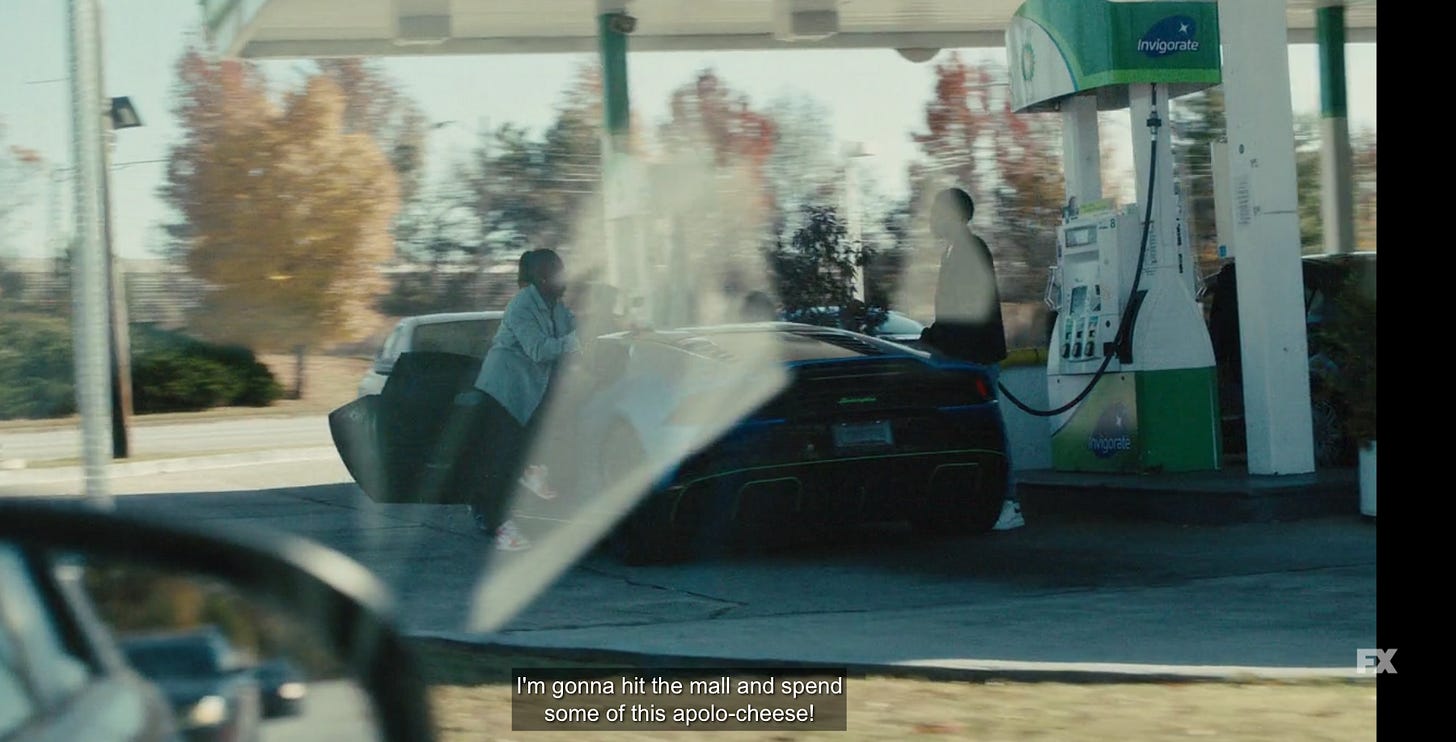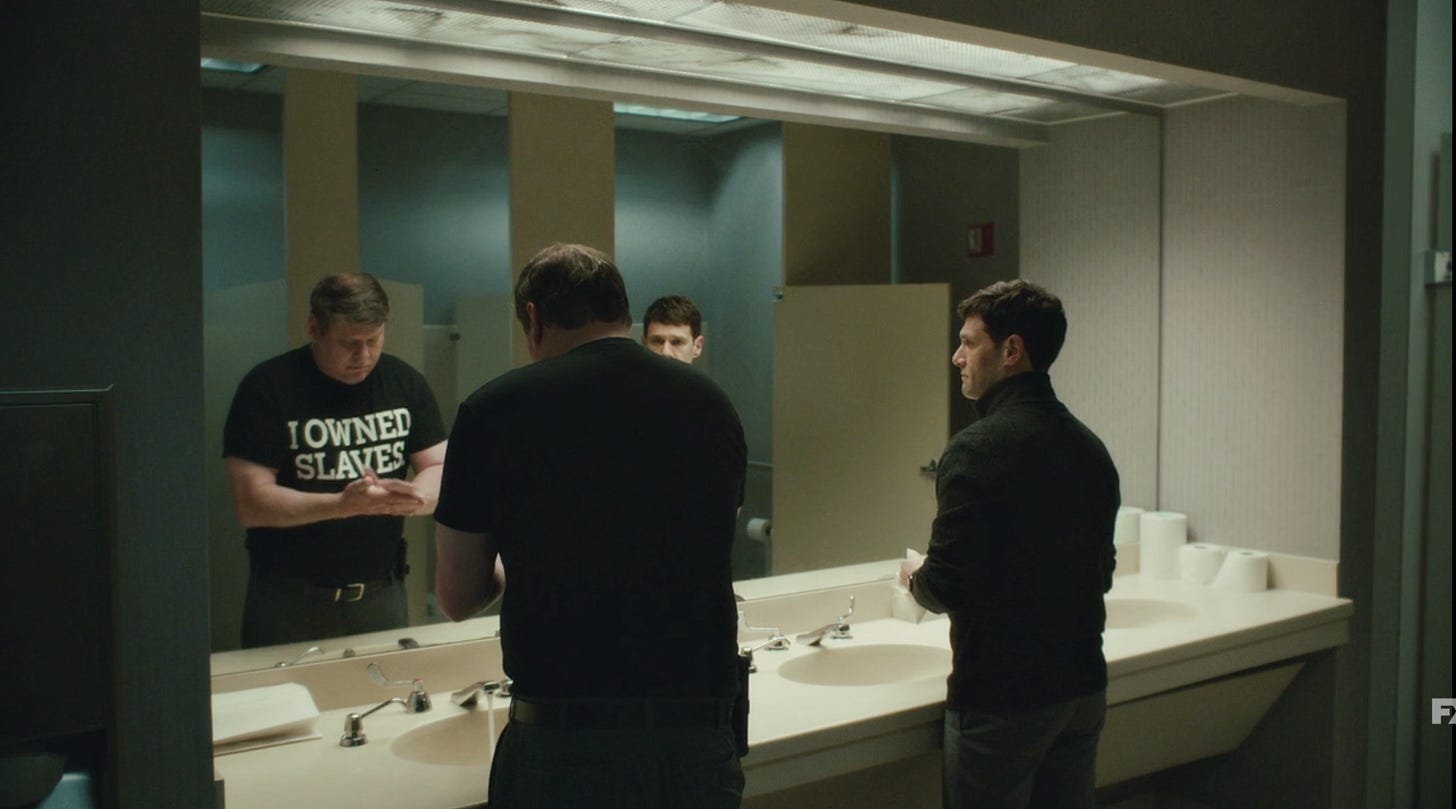Happy Tuesday!
Over the past week, multiple people told me that I had to watch the latest episode of Atlanta because the episode’s focus was on reparations.
For those that don’t know, Atlanta is a show created by Donald Glover, the artist most famous for the song and music video ‘This is America,’ which has raked in almost 1 billion views since its release in 2018.
I thought that if anyone could offer a thoughtful, truthful, pro-Black, comedic story about reparations, it would be Donald Glover and the team of writers behind Atlanta. Unfortunately, within the first 15 minutes, I was disappointed by some of the core narratives they were uplifting and, quite frankly, the racist tropes that they perpetuated.
You can head to the Hot Takes section for my full analysis of the episode. You can watch the full episode on Hulu or anywhere that shows FX or read this in-depth breakdown in The Ringer. The actor who plays the main character in this week’s episode, Justin Bartha, sat down with GQ to talk about the reparations episode if you’re interested in hearing his thoughts on the episode.
Here are some other reparations-related pieces you should check out today:
Michael Hariot weighs in on the lineage question in The Grio.
The Evanston Reparations Commission weighed whether to include rental assistance as part of the first round of the restorative housing grants — it decided against it.
The Asheville Community Reparations Commission has started to onboard members of its newly created commission.
Artist Harrison K. Smith created an exhibit called ‘making home here,’ which examines the racial wealth gap and how Black-owned homes are appraised.
With radical love,
Trevor
National News
Complex: Justin Bartha Breaks Down ‘Atlanta’ Reparations Episode
The Grio: Top 10 reasons why lineage-based reparations is a bad plan
Washington Post: Selma is tired of being just a symbol — they want change
USA Today: Diverse schools are taking a new approach to anti-racism: Training white parents
Washington Post: Jim Limber and the myth of the Confederate president’s adopted Black son
Bloomberg: An Artist Tackles the Racial Wealth Gap, and Then Tries to Close It
CNN: Pamela Brown looks at GOP lawmaker's ties with White supremacy groups
Washington Post: Lessons from the history of the White female abolitionists for today
Vanity Fair: KENTUCKY GOVERNOR VETOES BILL REQUIRING SCHOOLS TO TEACH KIDS SLAVERY WAS A BLIP IN AMERICA’S PERFECT PAST
Blavity: The Intersection Of The Racial Wealth Gap And Paid Family And Medical Leave
Jacobin: The Abolitionist Legacy of the Civil War Belongs to the Left
Nonprofit Quarterly: Safety Net Hospitals: Why BIPOC Wealth Creation is Needed to Achieve Health
Bloomberg Law: ‘The Time is Now’ to End Racial Inequities in Medical Research
CNBC: There’s a growing interest in wealth taxes on the super-rich. Here’s why it hasn’t happened
PBS: Student loan debt has a lasting effect on Black borrowers, despite the latest freeze in payments
Regional News
Evanston Roundtable: Evanston won’t change terms of first reparations grants to allow rental assistance
Citizen-Times: Asheville Reparations Commission onboarding under way; first meeting slated for April, May
Bloomberg: NYC Won’t Open Wells Fargo Accounts Over Racial Disparities
ABC News: Virginia GOP official accused of racist online post resigns
Springfield News-Leader: Southwest Missouri high school teacher accused of using critical race theory loses job
CNN: South Dakota restricts teaching of critical race theory in schools
Bronx Times: For NYC’s Black restaurant workers, the subminimum tipped wage traces links from slavery to resignation
Lohud: Irvington wants to teach the history of slavery ahead of monument unveiling
Spectrum News 1: White supremacy advocate no longer connected to Meredith College building
Boston Globe: Research finds stark racial disparities in how Boston responds to unhealthy conditions that trigger asthma
International News
Bloomberg: Ukraine Seeks Russia Assets, Oil Fleet Seizure as Reparations
Bloomberg: Plaque Explaining Liverpool’s Slave Trade Links Is First of 10 to Be Installed
Hill Times: Remorse and reparations are what makes apologies real
Jacobin: Canada’s Right-Wing Think Tanks Love Race Science
Hot Takes
Here’s the TLDR version if you don’t have time to read my full thoughts below:
The basis of the episode is a Black man winning a lawsuit against a Tesla executive whose relatives enslaved the man’s ancestors. The trial’s result gave precedence for other Black people to seek reparations for slavery.
Marshall Johnson, a white, recently separated, middle-aged father, doesn’t think much of the news until a Black woman named Shaniqua Johnson shows up at his house to inform him that his ancestors enslaved hers and that he owes her $3 million.
Shaniqua torments Marshall for the rest of the show — stationing outside his office with a megaphone and bringing her entire family to his apartment complex.
The episode, while funny, portrays reparations on an individual level rather than a systems level, the way I believe it should. It also too heavily focuses on white shame and not enough about the transformational way monetary reparations would assist Black families.
The episode relies too heavily on Black tropes to get its laughs in typical Hollywood fashion.
Atlanta, at the end of the day, is a comedy. Still, I believe it was a missed opportunity to tell the story about reparations in a way that centers and uplifts Black people while still offering comedic relief.
Full Analysis
I won’t be giving the play-by-play of the episode. But, again, if you want that, you can read this fantastic piece in The Ringer or this piece in Vulture — both of these articles give an in-depth summary of the episode.
Before I jump in with the issues I have with the episode, I’ll start with some of the pros that I gathered from the episode.
First and foremost, reparations as a viable solution to racial injustice have rarely been tackled in Hollywood. Other than the recently released Watchmen, which features a police-enforced special reparations program for victims of the 1921 Tulsa Race Massacre — the concept of reparations for slavery has rarely graced our tv screens.
The apparent difference between Watchmen and Atlanta is that the former is a fictional superhero drama, and while Atlanta is comedic fiction, the characters don’t have superpowers; they deal with the same real-world problems that we all do.
On its face, Atlanta, with its wit, charm, and diverse leadership, indirectly addressing issues like racial capitalism, white supremacy, and the United States’ racial hierarchy, is fantastic. The episode likely brought forth an issue that many of the show’s watchers, both Black and white, have never deeply thought about. But it did so in a way that centers white people and their animosity toward Black success, overemphasizes the individual’s role in offering forms of redress, and provides no critical analysis of the role systems and structures play in creating the racial inequities we face today.
The episode also accurately portrayed white fragility — reflecting the dismay and distress that many white Americans, even progressive white Americans, will feel when reparations for Black Americans are finally paid.
Now for the cons.
My main frustration lies in how Black people finally win reparations in the show. As mentioned previously, a recent court case ruled that a Tesla executive had to pay one of his former employees because his ancestors were enslavers.
Early on in the episode, one of Marshall’s coworkers says that the case “cleared the way for personal litigation now — they can just look you up and force you to pay.”
The debt owed to Black Americans must be paid by the government of the United States — not individual families.
The show fans the flames of this idea that it is up to individual households to right the wrongs of the nation’s past. Slavery, and the racist laws of the Jim Crow era, were enshrined in our nation’s laws; one could not simply enslave a person without being protected by societal structures. The episode divorced the idea that slavery was an “institution” and instead portrayed it as an activity that some white families engaged in. It also missed an opportunity to make mention of government-sanctioned policies that helped grow the wealth of white families after slavery like the Homestead Act.
Current opponents of reparations frequently rely on the “personal responsibility” narrative, arguing that white people worked hard to obtain their social and economic status. If Black people just took some responsibility for their actions, they too could reach the levels of success of their white counterparts.
A white person may come away from watching this episode thinking that reparations for Black Americans are simply about shifting the hard-earned money from a white family to a Black family. That is not the case.
The episode also too heavily focuses on white guilt and shame. While these are topics that I believe should be explored in film and TV, it oversimplifies the essence of reparations and represents it as a zero-sum game — if Black people get reparations, then white people lose. That is not the case.
Let’s take a look at some of the imagery from the episode (spoilers):
Here we have a white woman crying in front of her BMW — presumably shocked at the state of current affairs. While likely an accurate depiction of how many wealthier white women might feel about reparations for Black Americans, it is nestled in this belief that racial progress doesn’t also benefit white people.
Here we have Black men pumping gas in what we can assume is a newly bought luxury car from their reparations payments. This image uplifts the harmful narrative that Black people are undeserving of nice things. This moment speaks to what we think Black people, particularly Black men, who primarily hold fragile positions within our economy, should spend their money on. Many people already believe that Black people are frivolous with their money (an anti-Black sentiment), and I think Atlanta doesn’t do a good job of debunking that — particularly in this scene.
Black women in Marshall’s office are laughing and presumably celebrating the recent news. Paula, a white woman that Marshall works with, is seen saying, “lucky them,” in a sarcastic tone. This again speaks to the deservingness narrative, and while this is a sentiment that many people might feel about reparations, it’s important to note that reparations are not about “luck” but a debt that is owed to a harmed community. Could the episode have made more of an effort to make that clear? I think so.
This scene shows a white man wearing a shirt that says, “I owned slaves,” at the request of the Black family whose ancestors his ancestors enslaved. I can’t lie — I did crack up during this scene. The ridiculousness of it is just so striking. Instead of compensation, the family opted for public embarrassment — I hope people realize this would never happen. Was this episode written to speak to Black people or white people? Did it want to mock the shame that white people should feel about slavery? Did it want white people to feel motivated to engage in the fight for reparations? I’m not sure of the answers to any of these questions, and unfortunately, I don’t think the writers on the show are either.
Yikes. This scene shows a white man who commits suicide after giving a stunning speech to Marshall about why white people should be understanding of the events currently unfolding. Again, this zero-sum narrative is problematic and only furthers the white myopic view of the situation. As we witnessed on January 6th, white rage and violence are very real, but given Glover’s experience, one would think that he ensured there was more depth around such an important topic. As an inherently white country in character, structure, and culture — reparations for Black Americans, if done adequately, will disrupt the social construction of whiteness as the norm. Many white people might feel as if this disruption in the racial hierarchy spells the end of their lives, but let’s be clear, any violence we see as a result of reparations will be directed at Black people, not white people. The writers, again, miss out on an opportunity to center the Black experience in this scene.
Overall, the writing on the show was funny, but there was too much of a focus on what is owed at the individual level and not enough of a focus on systems and structures.
At the end of the day, Atlanta is a comedy, and this episode should be taken in jest, but Glover and his crew unsuccessfully offered a critique of racism at the macro-level of society and its historical evolution over time. Instead, it gave us an individualistic take that boils down the idea of structural racism from something that informs all of our cultural institutions to something that a simple swapping of funds can address.








